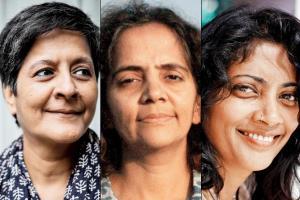She narrated this in a blog in 2015, blowing the lid on what was until then a practice shrouded in secrecy

Masooma Ranalvi, Shabana Diler and Lakshmi Anantnarayan
Masooma Ranalvi, Shabana Diler and Lakshmi Anantnarayan
Mumbai, Pune and Bengaluru
Women's rights activists, who conducted a survey on khatna in four states, which proved for the first time that the practice was prevalent in the Bohra community
In December 2017, the Ministry for Women and Child Development submitted an affidavit to the Supreme Court stating: "At present there is no official data or study [by National Crime Records Bureau, etc.], which supports the existence of FGM in India." It proved to be an obstacle in the battle for a ban on the practice of khatna in India, a practice of cutting the clitoral hood.
ADVERTISEMENT
Masooma Ranalvi's own experience with khatna was at the age of seven, when her grandmother took her 'for an outing' to Bhendi Bazaar. In a first floor room, she was pinned down by her granny and another woman, her panty pulled down while a blade cut a part of her genitals.
She narrated this in a blog in 2015, blowing the lid on what was until then a practice shrouded in secrecy. "My wake-up call came because the practice continues," says Ranalvi, who started a WhatsApp group with other women, which became WeSpeakOut, a collective of Bohra women and men campaigning against the practice. The blog brought relief in that "when you speak for yourself you're speaking for others also" says Ranalvi, but the lacunae remained: "There was no credibility to the claims. No research had been done. India was never considered an FGM practicing nation. Even when we approached government organisations, we were asked, where is the proof?"
It took two years but Ranalvi, along with Pune-based Shabana Diler and Bengaluru-based Lakshmi Anantnarayan put together a survey, drafted by France based Natasha Menon, and reached out to 94 respondents, including men, women, survivors, circumcisers, those who are pro-khatna and those against the practice. They came up with data that the court had to take cognisance of: 80 per cent of the community in India practices it. Diler says four states where the Bohra population is prominent, were chosen - Rajasthan, Maharashtra, Gujarat and Madhya Pradesh. In the survey, she says, even the testimonies from pro-khatna speakers showed that the practice is not minimalistic. "It's not just a nick. The cutters specifically said that a portion of skin is held and you cut it with the other hand and bury that portion," she says, adding that the researchers also provided the survivors with contact numbers of people they could reach out to for help.
The fight hasn't come without a backlash. Ranalvi says the community practices social boycott where dissenting voices are excommunicated. "They will not invite you for weddings, birthdays, you are not part of any social network and you can't bury your dead in the community burial ground; the priest will not come. No one will do business with you, which hurts especially because this is a trader community." It's why many members of WeSpeakOut choose not to be vocal about their support. That Ranalvi's father, a reformist, had already been boycotted, made the struggle easier for her to bear.
Anantnarayan, who has previously worked with Equality Now, one of the first organisations to look at FGM as an international human rights issue, says after the court case - the matter has now been referred to a constitutional bench - the campaign has gone two steps back.
A Detroit judge has dropped nearly all the charges against a Michigan doctor accused of performing female genital mutilation on at least nine underage girls, according to court documents. In November, the judge ruled that the federal female genital mutilation law is unconstitutional and that Congress did not have the right to criminalize the practice. "The pro FGM voice has gained some sort of confidence [since then]. I feel we have to regroup to see what's next." Ranalvi hopes that their campaigns have at least broken the cycle. "Once I don't do it to my daughter, she won't do it to hers."
Catch up on all the latest Mumbai news, crime news, current affairs, and also a complete guide on Mumbai from food to things to do and events across the city here. Also download the new mid-day Android and iOS apps to get latest updates
 Subscribe today by clicking the link and stay updated with the latest news!" Click here!
Subscribe today by clicking the link and stay updated with the latest news!" Click here!






